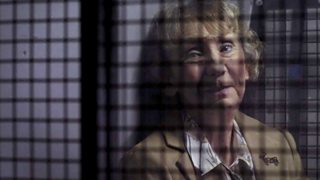How and why did you get into writing?
How: I’ve always written. I wrote my first play at aged 9, wrote through school and University. I devised and wrote 6 plays with the fantastic Youth Theatre. But despite longing to be a writer, I never thought I could actually be one. I didn’t think I was clever or witty or cool enough. I never pursued it properly until I met my husband (the actor, ) and started using all my holiday time from work to devise and write plays with him. It was only when I was 36 (36!!) that I had the confidence to start thinking maybe I could really do it. I managed to get a commission for but struggled to get another commission. Encouraged by in Cambridge, I co-wrote a play with Michael called “Martha Loves Michael” about an obsessive Michael Jackson fan. That felt like that was the start of my writing career.
So why write? I don’t know is the true answer. I just know that all my life I’ve felt compelled to write. My brain feels hard-wired that way – making stories up and then writing them. There’s something hugely addictive about writing. There’s a magic, an alchemy, when things start working – when your subconscious solves things, when you surprise yourself, when you make yourself laugh or cry. With the Youth Theatre I found I could write plays which impacted emotionally on the audience, and which resonated with my young actors… And THAT is a brilliant feeling.

Sally Abbott
What’s the importance of having a good spec’ script, even if it won’t get made?
You can’t be a writer without a good spec script. Yes, you can “write” but you can’t make a career out of it without one. Everyone has brilliant ideas but it takes something else to turn those ideas into a script. It takes work and frustration, perseverance and a LOT of rewriting.
By the time I wrote my spec script I had a Doctors script, a co-written play and “Cowboys and Indians” a script and TV series I’d been developing (for years) with Michael and writer/director . But what I didn’t have was anything that had been written just by me, with characters and stories that I was solely responsible for. If I wanted to get on schemes, write on continuing drama or existing TV shows or even meet anyone then I needed to have a script which was 100% me. I needed to show who *I* was. What everyone wants to know is “what’s your voice?” Unless you’re always going to be in writing partnership, you need to show people that pure unadulterated voice. A spec script is like a dating app for writers and script execs.
Everything I’ve got is a result of my first spec, a coming-of-age horror film called “Camp Fear”. I wrote it quickly – in about three weeks. To be honest, I wrote it before I even knew what I was really doing as a writer. I did a few rewrites and my agent started sending it out. It got me onto the , the , and through so many other doors. Things accelerated for me within a couple of months of writing it - notably doing the Writers Academy – and I’ve gone from script to script ever since. I’m embarrassed to admit it but it’s my only spec script. It’s still not been produced. My agent always asks “where’s your next spec?” I know I’d get more work if I did another. (H’mm. *Adds new spec script on “to do” list*.)

Marcia Warren as Olive Russell in Casualty (series 29, episode 21)
What are your top tips for developing strong and believable characters?
In my experience, characters either emerge fully formed – like the ones in “Camp Fear” and ’s character Olive Russell in – or they take a huge amount of sweat and tears.
A useful tip is to have five or so words to describe them and make sure at least one of them is a contradiction. Characters like people should be complex. They’re not all one way or another. If they were, they’d be boring.
I often think of people I know or actors I’d like to play them. I’ve written two parts for who’s one of the quickest and cleverest actors I’ve ever met. He can switch energy and emotion instantly which is a gift to a writer.
Characters should have secrets; they need to be driven by wants and needs that contradict each other. A character without a want is impossible to write. They all need to be different and be able to drive the story forwards in different ways.
It’s an old tip but if you can cover the names of the characters up on a script and NOT be able to see a difference then you’ve got trouble. They need to have their own distinct original voice.
I do ’s ten questions on each character along with police lists, a biography and occasionally write monologues for them before I send them into a script. I usually only find out what they’re really like when I write the script.
Most importantly they have to feel “alive” and jump off the page. You know when it happens – you can feel it. In the same way, you can feel when they’re not. Trust that instinct.
(a brilliant writer who recently wrote ) once said to me: “dig deep not wide”. Mine your characters, get under their skins, find their heart. And make sure you love them.
And whatever you do, make them active. A passive character is impossible to write and just as hard to watch.

The 主播大秀's Continuing Drama shows: EastEnders, Holby City, Casualty & Doctors
What has working on Continuing Drama taught you? Why is it so valuable for a writer?
Continuing Drama taught me everything about writing TV. You get to work with generous people who are cleverer than you. Being in a story conference is like a masterclass in storytelling.
It’s collaborative – you’re not working on your own, you have a huge team supporting you. There are often scheduling, story, compliance and budget restrictions - it’s like a puzzle you have to solve.
More than anything you get to pitch, write and WATCH. Within three months of an episode finishing shooting, you watch it on screen with millions of other people. You quickly learn what works and what doesn’t; what you could or should have written better or differently; what story point you undersold; which actors surprise you with what they can/can’t do; how your written words translate on screen. Nothing helps you learn more than watching your work.
You learn that the thing you felt was a fudge when you wrote now looks like a massive box of fudge on screen. You learn how to write better, how to trust your instincts, how to listen to a production team and take on board their views.
Never underestimate the huge skill you develop in writing to a deadline too. and can’t wait until you get it 100% perfect or for the “muse” to hit. They need that draft at 9am on Monday. No excuses. You have to deliver. You learn how to write even though you feel ill or tired or paralysed by “the fear”. And you learn how to write with joy and to touch millions – what can beat that?
I don’t know the exact figures but I guess most writers start in continuing drama. There’s a reason for that. Despite whatever anyone says, those shows want your original voice, your “take” on that episode, that story, those characters. They need you to make it great. To take the story document and write an episode which shines. If you can do that you will be noticed, I promise.
Continuing Drama is an incredible place to develop and hone your craft. Never think it’s an easy option. Writing on continuing drama is often even harder and tougher than writing original work.

Casualty, series 26 episode 16 'Next of Kin' written by Sally Abbott
You’ve said that writing is a marathon not a sprint, what do you mean?
New writers worry too much about it not happening for them “right now”. Some get bitter, jealous and competitive about other writers and constantly compare themselves to them. We’ve all done it. It isn’t helpful. And it’s definitely not an empowering or powerful way of being. I think some writers beat themselves up for it and make it mean they’re a failure. They’re not – it’s just this industry is unremittingly tough and hard to get into.* It’s not about winning or losing the sprint, it’s about setting yourself up for the marathon.
I believe you have to be ready for it. It’s not just about being able to write. It’s about being able to take on notes – sift through what works and what makes it worse; being able to work with people and not be a dick; being confident enough to know when to challenge and also to say when you need help.
People worry about missing the boat, that it’ll never happen but everything you do as a writer feeds into everything you do as a writer. You don’t have to be 24 to make it as a writer, you can be in your 30’s or 40’s or 50’s. Yes, people will always be interested in the hot young things but not at the exclusion of all else.
Ideas and stories never die. I’m currently developing ones I’ve had for years. Some I’d deliberately held back because I didn’t feel I was ready to develop them or could do them justice. I had to trust there would be a time when I felt ready and feel I am now. Plus it helps that I’ve reached a stage where companies will (hopefully) listen to them when I bring an idea. I’ve written enough scripts for them to (again, hopefully) be able to trust me. It’s a long-term approach.
* No writer ever feels they’ve “made it”. The fear of rejection is ALWAYS there.
How can aspiring writers build their ‘writing muscles’?
Most importantly – WRITE and REWRITE. Write when you don’t want to not just when you feel like it. Write to deadlines. Find competitions or schemes to go for.
Set yourself achievable goals. Don’t feel you have to try and do the whole thing at once, it’s easier in manageable chunks. Start with an idea, then work out the story and characters, then an outline, then a treatment (a scene by scene for the whole script) then attack your first draft. Give yourself task/page count goals so you know when you can relax and feel smug you’ve hit your goal for the day.
Study writing – read scripts, watch TV and films. The has by brilliant writers.
Join a writing group, especially if it’s led by another writer or person in the industry. Not because you can use their contacts and for networking but because, hopefully, they really know what they’re talking about.
Get used to showing people your scripts and ask them to tell you honestly what they thought. Don’t get defensive if they say they didn’t like it. Get friends to read it out loud with you – work out when the energy and focus dipped, which bits bored you, which bits excited you, what questions it raised.
And finally – remember that the most important thing to do is write and rewrite. Most of your working life as a writer is spent rewriting. It’s never perfect on a first or the second or even third draft.
The only way to really develop your writing muscles is to write.
Watch an interview with Sally Abbott
What setbacks have you had and how did you deal with them?
After my first commission I couldn’t get another one for years. I was sacked from my second ever script and sacked from a fairly recent one too. I’ve spent a year developing stories for an incredible “would have been life changing” TV job and was rejected. I’ve developed TV series for years that ended up getting rejected. I’ve had tough, brutal, soul destroying notes and been told that what I’m doing is NOT good enough. I’ve turned down paid work to develop my film because “the money is definitely there” only to get dropped. I’ve spent months writing scripts on projects which ended up dying a death.
In other words, exactly what most other writers go through.
The way to deal with all these things is the same. Feel sorry for yourself for about five minutes then suck it up. Move on. And get writing. Write your way out of the funk. Fight back with writing.
says you’re not a proper writer until you’ve been sacked. Rejection is part of being a writer. No writer has EVER had a career without rejection. It’s a horribly paranoia inducing profession – once said the collective term for writers is “an insecurity of writers”. Never were truer words said.
That doesn’t make it easier. Rejection is sh*t. It’s easy to take it personally and feel like you’re the tw*t who got it wrong. Rejection is a writer’s badge of honour. Take what positives you can from each experience and move on. And know that working on several projects at a time makes rejection easier to handle.
What have you got coming up?
I’ve created and written 3 episodes of a new series called “” for 主播大秀 Birmingham, 主播大秀 Daytime and 主播大秀 Worldwide. It’s a 10 part series for 主播大秀1 shot earlier this year with and as the leads. Each episode is self-contained with a “death of the day”. Despite being about death, it’s also very much about life with bags of humour and joy.
I’m currently working on series two (fingers crossed) and developing a mixture of comedies and dramas for TV.
I’m also involved in the Hat Factory in Luton’s a brilliant opportunity for new writers (closing date 15 November 2015).
Be Inspired:
